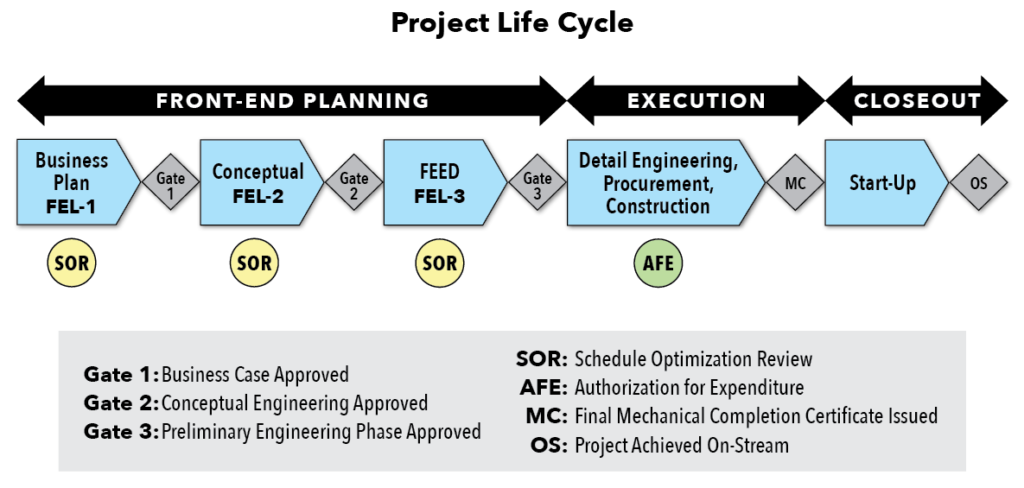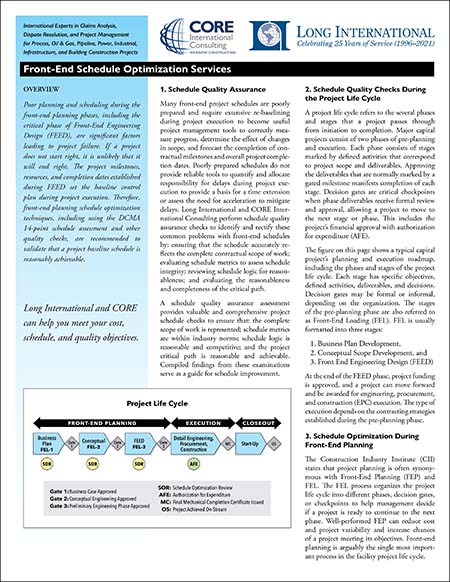
Services
Front-End Schedule Optimization Services
We assist with the implementation of front-end loading project management techniques to maintain cost, schedule, and quality objectives; provide transparency and accountability for all project stakeholders; and avoid, minimize, or resolve disputes during the entire project life cycle.
Early in a project’s life cycle, the ability to influence changes in design is relatively high and the cost to make those changes is relatively low.
Poor planning and scheduling during the front-end phases, including the critical phase of Front-End Engineering Design (FEED), are significant factors leading to project failure. If a project does not start right, it is unlikely that it will end right. The project milestones, resources, and completion dates established during front-end loading set the baseline control plan during project management and execution. Therefore, front-end schedule optimization techniques, including using the DCMA 14-point schedule assessment and other quality checks, are recommended to validate that a project baseline schedule is reasonably achievable.
Schedule Quality Assurance
In partnership with CORE International Consulting, Long International performs construction schedule reviews for quality assurance that identify and rectify common problems with front-end schedules by ensuring that the schedule accurately reflects the complete contractual scope of work; evaluating schedule metrics to assess schedule integrity; reviewing schedule logic for reasonableness; and evaluating the reasonableness and completeness of the critical path.
A front-end schedule quality assurance assessment provides valuable and comprehensive project schedule checks to ensure that: the complete scope of work is represented; schedule metrics are within industry norms; schedule logic is reasonable and competitive; and the project critical path is reasonable and achievable. Compiled findings from these examinations serve as a guide for schedule improvement.
Front-End Schedule Optimization Services
The Construction Industry Institute states that project planning is often synonymous with Front-End Planning (FEP) and Front-End Loading (FEL). The FEL process organizes the project life cycle into different phases, decision gates, or checkpoints to help management decide if a project is ready to continue to the next phase. Well-performed FEP can reduce cost and project variability and increase the chances of a project meeting its objectives. Front-end planning is arguably the single most important process in the facility project life cycle.
FEL presents an excellent opportunity to apply robust planning early in a project’s life cycle when the ability to influence changes in design is relatively high and the cost to make those changes is relatively low. It typically applies to industries with highly capital-intensive projects with long life cycles.

Project Advisory Services
Long International and CORE’s project advisory services assist with the implementation of project monitoring techniques to maintain cost, schedule, and quality objectives; provide transparency and accountability for all project stakeholders; and avoid, minimize, or resolve disputes during the entire project life cycle, including the important front-end loading project management and design phases. To learn more, read our article Schedule Optimization During Front-End Planning and download the Front-End Schedule Optimization Services brochure above.

Schedule Quality Assurance Reviews
Poorly prepared schedules do not provide reliable tools to quantify and allocate responsibility for delays to provide a basis for a time extension or to assess the need for acceleration to mitigate delays. We provide schedule quality assurance review services to correct common schedule problems.


